There has never been a better time for some summer reading. It’s hot, it’s allergy season, and we still have the coronavirus to contend with. Might as well curl up inside with a good book. Though some things are open (sort of), it looks like people will need to social distance for a while longer. So in honor of the Flyer’s “Summer Reading” issue and to help awaken your appetite for some of Memphis’ luscious local literature, I spoke with three Bluff City authors about their new releases, the long journey from initial idea to bound book, and publishing in a pandemic. Welcome to the Bluff City Book Club.
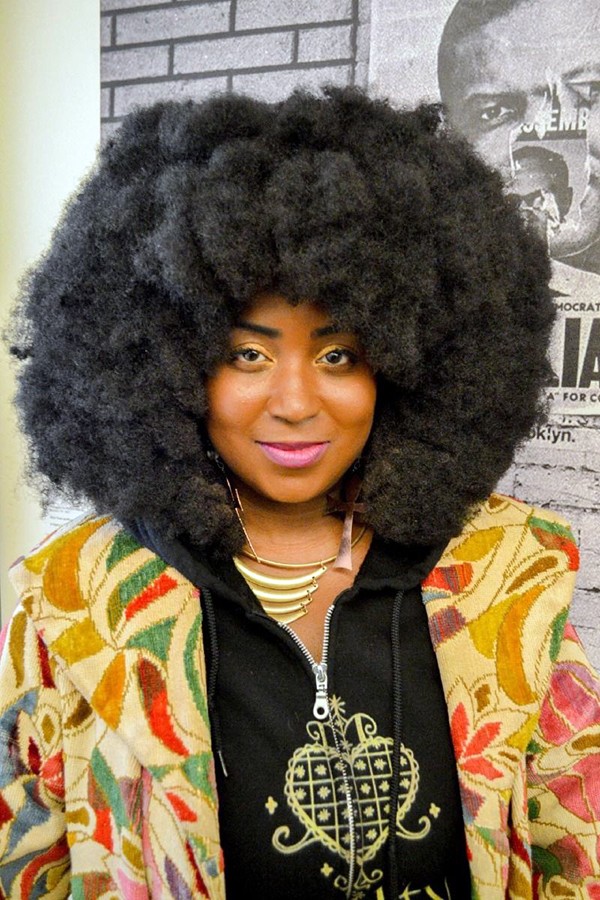
Sheree Renée Thomas
Sheree Renée Thomas
Memphis author, poet, and editor Sheree Renée Thomas released Nine Bar Blues, a new collection of short stories, last month via Jack White’s Nashville-based Third Man Books, the literary arm of the Raconteurs and the White Stripes rocker’s Third Man Records label. Thomas is the author of Shotgun Lullabies: Poems & Stories and the editor of the critically acclaimed collections Dark Matter: A Century of Speculative Fiction from the African Diaspora and Dark Matter: Reading the Bones. She was also a recipient of a 2017 Artist Fellowship from the Tennessee Arts Commission.
The author’s newest collection is musical and Memphis to the max, but with a months-long global pandemic and what is now the third week of global protests sparked by the murder of George Floyd by a police officer, Nine Bar Blues enters a world that looks increasingly like the speculative landscapes inside it. And where the nation’s attention is not exactly focused on new releases.
“The original date was back in April, but the pandemic snuck up on us,” Thomas says of Nine Bar Blues’ release date. “We decided we would be hopeful and push it back and hope that things are a little better.” The author had to postpone, reschedule, or cancel appearances on a book tour with stops at Knoxville’s Big Ears Festival, a conversation in New York with Saul Williams, and the punk venue Country Club in London. Not to mention, of course, the Memphis events. “Not quite a Stephen King tour or J.K. Rowling, but it was exciting to me,” Thomas laughs. Locally, the author says she was looking forward to an event at the Central Station Hotel. “We were gonna do something at the train station that I was looking forward to, because, before the pandemic, that was my little hangout. It would be cool to be around all the music.”
But Thomas hasn’t let the timing get her down. “Listen, I was gonna see Journey this summer, so it’s not just me,” she muses. “It’s been a big sea change for the book publishing [industry], but I can just imagine for musicians where playing in person is just part of the magic.”
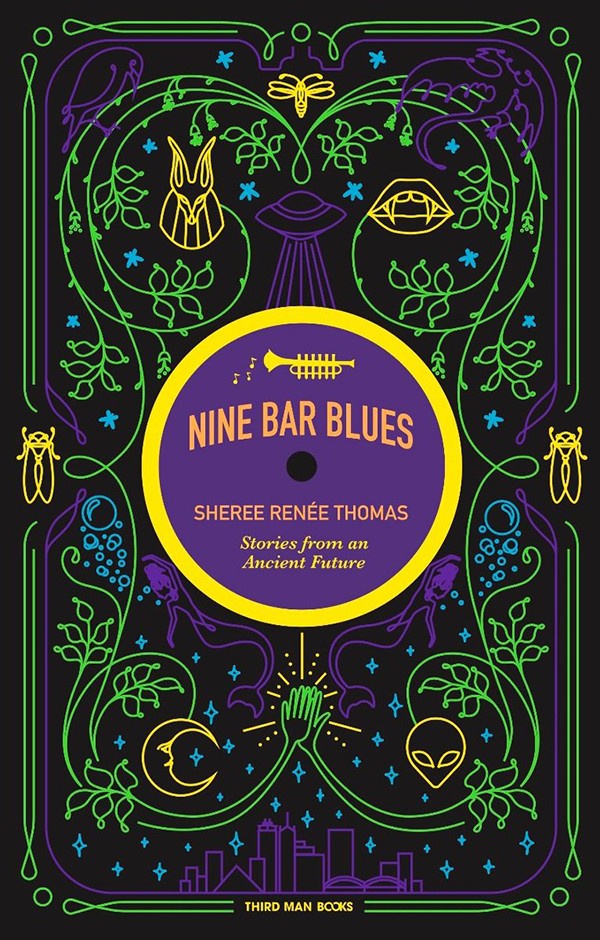
Music in the Mix
Music is part of the magic of Nine Bar Blues. It informs the title, the prose in its lyricism, and it acts as a recurring motif that ties the collection together. The pages practically snap, crackle, and pop with the sounds of the South, from country to blues to gospel to funk. And it’s in the author’s embrace of multiple genres and modes of storytelling that she stands out as a keen observer of the multihued mosaic that makes up Memphis’ culture.
“I didn’t set out initially to write a book where each story has some exploration of a genre, but I realized that that was what I was doing. And for me music is such a big part of my everyday world. I was born into a family that truly, truly loves music,” Thomas says. “I think my first memory is probably hearing, if not Led Zeppelin, then hearing Parliament Funk in the house.”
About “Head Static,” one of Nine Bar Blues’ stories in which the musical motif is most readily apparent, Thomas says, “I was thinking about what it might be like if your very existence depended on the ability to experience new music. … That constant innovation that humans have in expressing themselves through rhythm and tone.” Laughingly describing finding a world-saving song like some hidden treasure out of Raiders of the Lost Ark, she adds, “I also wanted to play on the quest story.”
“Claire had spent decades foraging through black vinyl, seeking black gold, the sound, the taste of freedom,” Thomas writes in “Head Static.” For Clair, the protagonist of “Head Static,” music is a sword and a shield, a way to connect and a path to forgetting. She and Animus drive through deserts and rain, crossing borders in search of underwater pyramids and ancient melodies of the future.
It’s not all music in Nine Bar Blues, though — or at least, not all the collection’s music is for celebrating. In “The Dragon Can’t Dance,” a dancing dragon from Crown Heights lives chained in a crystal computerized cave, the unknown creator and choreographer behind the superstar Isis. In “Nightflight,” the sun refuses to rise in Memphis. There are poisoned waters and protests alongside the Parliament records.
Writing on the Borders of the New Weird South
The eclecticism of Nine Bar Blues makes it refreshing when compared with national depictions of the South. (Remember that ridiculous and short-lived Memphis Beat show where Jason Lee played a cop whose side hustle was as an Elvis impersonator? Yeah.) Thomas’ genius is in tapping into the already existing strangeness.
“I like to say that I’m writing on the borders of the New Weird South,” she explains, “which is connected to the bridge to the Old.”
“So many wonderful, truly iconic American contributions have come out [of Memphis and the South] that couldn’t have come from anywhere else. It’s just this strange alchemy of our dark and bright wondrous history and the way we have related to the geography here. Just the music in our language that comes from all of the different cultures that tried to carve out a living out of the land here,” Thomas says. “It’s not a static thing, what we do here. It’s always changing and moving.”
Thomas explains that the New Weird South is a body of work that is interstitial, combining speculative fiction with a Southern Gothic feel in order to better represent the changing cultural landscape. It’s a subset of the New South, a literary movement away from the old “moonlight and magnolias and sticky, sultry, summer nights” clichés. Instead, in embracing the full spectrum of the Southern experience, the movement explores a more authentic, wilder, and weirder landscape.
[pullquote-3] “You hear echoes, some of our greatest hits, of course, Faulkner, Walker,” Thomas says. She notes that stories in the New Weird South mode are not necessarily linear, sometimes approaching their truth in a series of concentric circles.
“It takes us in a space that is not rooted in the traditional modes of storytelling. There’s more space for strangeness,” Thomas continues. “It’s almost like a Southern magical realism, or the marvelous real.”
A Lifetime Reader
Along with references to P-Funk and magical realism, Thomas mentions a multitude of writers and books in our conversation. “I have always been a reader. My mom taught me to read early,” Thomas says. Her father was in the Air Force, so the family traveled often, before resettling in Memphis when Thomas was 7 years old. Reading was a way to make sure a young Sheree would be caught up wherever they landed next — and to ensure she had easy access to entertainment to keep her occupied. “The house was full of books,” she remembers. Her grandparents were great storytellers, too. “They were always sharing these amazing stories from their lives, which seemed like foreign lands to me because they were so different,” Thomas says. “I learned about these different things. I learned about tent city when they were trying to vote and got kicked off the land.”
“My parents were big science-fiction fans,” Thomas recalls. “I found my way to Ray Bradbury and Isaac Asimov.” Thomas particularly liked the Bradbury stories set in small towns, with the mythical hidden everywhere between a thin veneer of the mundane. That and Bradbury’s poetic prose surely influenced the speculative fiction Thomas would go on to one day collect in magazines and write herself.
“I remember the very first time they let me get a library card. It was at the Hollywood branch of the library,” Thomas says. “They would hand me science-fiction stuff because they knew I liked the scary stuff, the strange stuff.” Formative time spent at an Air Force base in White Sands, New Mexico, driving past replicas of rockets and surrounded by snow-white sands that Thomas describes as looking like an “alien landscape” must have made sci-fi more appealing — and lent credence to the idea that the marvelous and the mundane are separated by only the thinnest of barriers.
In high school and college, Thomas attempted to turn her studies toward more practical career paths — even considering chemistry. “The lab cured me of that,” the author laughs. But an encouraging creative nonfiction professor and a stint working at an independent bookstore helped push her to follow her passions. “At the time I had like 15 jobs,” she explains. “I was Valedictorian in high school, but I was also one of the few young women who was already a mom.” One of those jobs was at Gallery 250, a bookstore and art gallery on S. Main. “Which was like heaven because I was surrounded by books and art.”
There Thomas met fellow writer Jamey Hatley, a coworker who came into work with an issue of Black Enterprise magazine that focused on women publishers. For Thomas, it was eye-opening. So, she says, “I made a plan. I was like, ‘I’m going to New York.’”
While in New York, she worked at Forbidden Planet, a sci-fi bookstore across from the Strand. “I did that and every job you could think of when it comes to writing in a book publishing house.” She wrote jacket copy, drafts of sales copy, reviewed books, and did proofreading and copy-editing. She was totally immersed in a world of words.
After the Blues
Now, though, Thomas is back in the Bluff City. “I’m back home, and I don’t think I would have written quite the same collection if I wasn’t home,” she says, suggesting that her roots in Memphis and her time away — both as a child and working in New York — gave her perspective on her hometown.
As for what’s next after Nine Bar Blues, Thomas is currently doing some story consulting for a video game project. And she’s considering adapting a feature-length screenplay she wrote in New York to set it in Memphis. “I wrote it before the horror renaissance with Jordan Peele and Get Out. Of course, we didn’t call ’em social thrillers then. We were calling ’em horror movies,” Thomas laughs. The film, as she explains it, would be a horror movie disguised as a romance dealing with history and burial grounds. It was originally set at the African burial grounds at Wall Street, what Thomas calls slavery’s cemetery. “They built Wall Street literally on the bones of these people.”
Whatever is next for Thomas, whether it’s Jordan Peele-level horror film or another genre-spanning collection of funkadelic speculative stories, readers can safely expect a wild, weird, and wondrous ride.
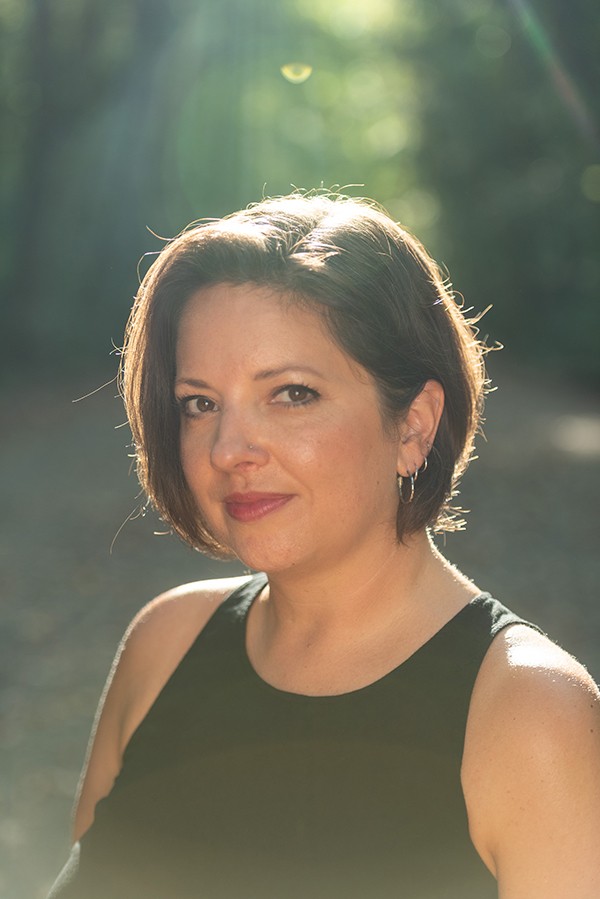
Kristy Dallas Alley

Richard J. Alley
Kristy Dallas Alley and Richard J. Alley
“We met in high school. It was 1987,” says Richard Alley, author of Five Night Stand and the new novel of historical fiction, Amelia Thorn (Beacon Publishing Group), and husband to Kristy Dallas Alley, author of the forthcoming The Ballad of Ami Miles (Swoon Reads).
The literary power couple met in drama class at Kirby High School, making the arts a feature of their relationship from the beginning.
“I’ve always been a really big reader. I think I peer-pressured him into being more of a reader,” Kristy says, laughing. (The two laugh often as we conduct our interview over the phone.) Richard admits that he read more often “as a kid” and then grew out and back into it. But, about Kristy, he says, “From the day I met her she was always reading.”
“In middle school, there was a period where I was reading a book a day, kind of to the exclusion of all else,” Kristy remembers. “I wouldn’t really do my schoolwork, so I was grounded all the time. Then when I was grounded I couldn’t leave my bedroom so I would read just constantly.”
The Writing Life
Kristy works as a high school librarian, which has helped to keep her finger on the pulse of what’s popular in Young Adult fiction (or YA, as it’s called in the publishing industry). It’s both a help and a hindrance, she explains. “YA is a very different kind of publishing space than adult literature. So in some ways it’s helped me to stay immersed in that world, and in some ways it can be intimidating. It can be hard to push past the idea and the pressure of what is selling in the market in YA right now,” she says. It’s about striking a balance between what’s marketable in a genre that turns more quickly than most to chase hot trends, and writing the story she wants to write. “Is there a way to make those two things meet in the middle?”
“There’s a lot of skill and talent needed for writing, but there’s also a whole lot of luck when it comes to getting published,” Richard chimes in.
[pullquote-4] “In YA, there are a lot of things focused around your debut year, and you’re in a debut group,” Kristy explains. “I’m in a debut group with a lot of young writers who are really shooting for the moon. They want to be able to make a career out of it and quit their day job, and you see a lot of sort of crashed dreams by the end of a debut year,” she says, admitting that for her it is more about seeing the story she’s held in her head fully realized in the real world. “In reality, very few writers are going to become that rock star household name,” Kristy says.
In the end, what it all comes down to is this, Kristy sums up: “Am I trying to sell a book or am I trying to tell a story? If I were only trying to sell a book, I would think the pressure would be overwhelming.”
In a career path littered with the rejected manuscripts of would-be writers, Richard says the thing itself has to be its own reward. “You have to love the process. You just have to love writing.
“It does help to have someone who has done it as your partner because then they understand,” Richard admits. Not only is one’s partner more understanding if they have also traveled the writer’s road, they can help with plotting, editing, and untangling tricky passages. It’s a busy life, balancing four children, two careers, multiple manuscripts, but being able to bounce ideas off each other helps.
Richard and Kristy have discussed their fictional worlds on long car trips, on walks, and at the dinner table. “He holds his stuff a little closer to the chest for longer until he’s sort of in it and knows that it’s gonna take,” Kristy says.
Kristy says that adds another layer to the relationship, one they had to learn to navigate. “I’m such an English teacher and an editor. He learned to tell me, ‘Right now, I just want you to tell me if it’s good or bad.’”
“Mainly I just want her to tell me that it’s good,” Richard says, laughing. Kristy continues: “At some point I’ll proofread the manuscript. I’m the grammarian. I mean, he’s not terrible at grammar, but I know all the little nit-picky rules you wouldn’t know unless you taught seventh grade English.”
“That’s the level I write at — seventh grade,” Richard interjects.
“You gotta get down in there with the red pen sometimes,” Kristy adds, laughing too.
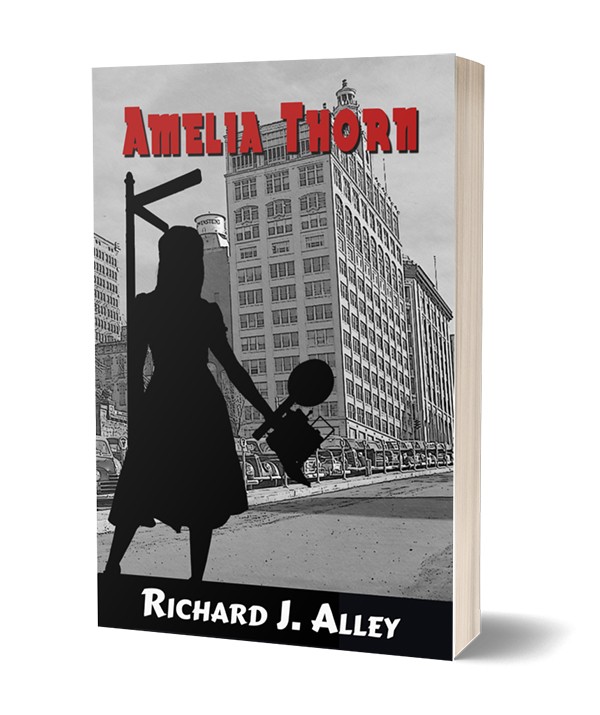
Amelia Thorn
“This is my second published novel, but it’s actually the fourth manuscript I’ve written,” Richard says of his newest release. “And I look back, and I have no idea how that happened.”
“I know how,” Kristy chimes in. “Richard is a much more disciplined writer than I am. When he gets an idea and he’s in the grips of a story, he’ll make time.”
Richard, who has written for his own blog, The Commercial Appeal, and Memphis magazine, says that part of that discipline means he tries to make his day job work for him. “For me the journalism I wrote always helped inform the fiction,” He explains. “When I was writing Five Night Stand, I wanted to learn more about jazz, especially in this region, in this city. So I pitched a story to Memphis magazine about the history of jazz in Memphis, which was nice because I got to do research and get paid for it and work it all out in my head and on paper.”
“The same thing with Amelia Thorn,” he continues. “As I was in the process of writing it, I started a series [about local photographers] for Memphis magazine called ‘Mind’s Eye’ where I got to talk to these great photographers all over town and really pick their brains and see what was behind the lens. So in that respect I use one to help the other.”
As readers may have guessed, Amelia Thorn’s eponymous protagonist is a photographer. She’s being interviewed on the eve of a retrospective of her life’s work, and the interview (an unobtrusive and clever framing device) leads her through her journey from Mississippi to Memphis and through hardship to a career as a celebrated photographer.
“I started late 2013, early 2014, and I got to about 40,000 words, which is about halfway through. And I had heaped all this tragedy on Amelia and I didn’t know where to go with her,” Richard remembers. “At that point, too, Five Night Stand was picked up, so I had to edit that. And I had another idea for a book, so I actually put Amelia Thorn down and wrote another manuscript, which is not published. But I started and finished that one. And then in November 2016, there’s the presidential election. And then what rose out of that and watching Kristy and my daughters and watching women all around the country and the world and friends of ours and their daughters, how they resisted and persisted and they fought back and became so vocal. And it was just so surprising.”
In the summer of 2018, while a resident at Crosstown and with the repercussions of the 2016 election still swirling around in his head, Richard finished Amelia Thorn. “My plan was to fully edit the other manuscript I had written, but I ended up picking Amelia Thorn up, and I realized then that she was not the victim I was making her out to be,” Richard says. “What was going to happen in the next 40,000 words was she was going to become stronger and more independent and hopefully someone to look up to.”
[pullquote-1] Richard says he just couldn’t let Amelia languish any longer. “The characters are alive to me,” he says. “I felt terrible leaving her in that state. Leaving her unfinished and with all this shit I dumped on her. I felt like I had to get her out of that.”
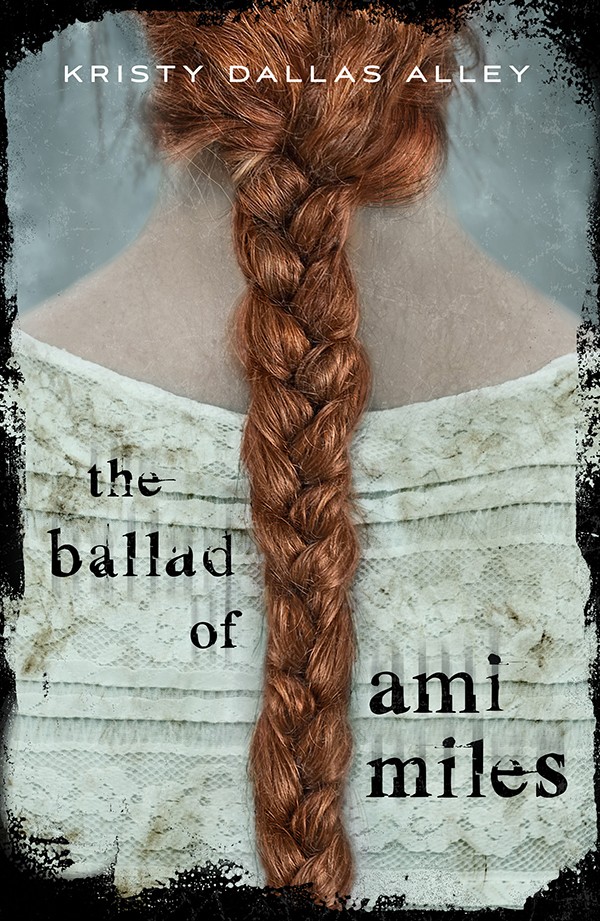
The Ballad of Ami Miles
While Richard’s newest novel is a more traditional literary Southern novel, Kristy’s is a dystopian YA bildungsroman (or coming of age tale). Think Alfonso Cuarón’s Children of Men but Southern and written for teens.
In The Ballad of Ami Miles, America has been laid low by the scourge of infertility. The infertility was caused by a virus, and there was some immunity to it, meaning that children are still-born, albeit rarely. Ami’s mother (who has been missing for years) and aunts were able to conceive. “[Ami’s aunt] reveals to Ami that she knows where her mother might be, and her and the aunt and uncle conspire to help Ami to run away in search of her mother,” Kristy explains. At the time she leaves, Ami thinks it will be a simpler thing to find her mother. Of course, that would be an awfully short story.
[pullquote-2] “When Ami gets around people her own age for the first time, she actually falls for a girl,” Kristy says. “She didn’t even know that was a thing that could happen. So she has to face a big decision between does she have an obligation to her family to do what they have trained her and raised her to believe is her destiny, or does she have a right to choose a different kind of life than she ever imagined she could have.”
“Until I ran, I was always the smallest person in my world, and what I knew about the outside of myself was no more than could fit in the palm of my hand,” Kristy writes in The Ballad of Ami Miles. The author says one review called Ami Miles “positive post-apocalyptic fiction,” a summing-up that she could approve of.
“I used to like the hopefulness of it,” Kristy says of the apocalyptic fiction genre. “It became this big thing after The Hunger Games.” She says she appreciated the aspect of characters living a life that is nothing like what we see as normal but somehow persevering. Now, in the post-Hunger Games world (and a world that seems to look increasingly like the dystopian landscape of that series), novels in that vein tend to focus more on the systems of control than on the characters who inhabit them.
The idea for The Ballad of Ami Miles, though, is rooted in character. Driving to Panama City Beach for vacation, the Alleys would pass an abandoned trailer dealership between Birmingham and Jasper, Alabama. The scene looked so desolate, Kristy couldn’t help seeing it as some post-apocalyptic landscape — and wondering who might be hardy enough to make a life there.
“It was always a highlight of the trip because I’d be driving and we’d pass through there and then I’d get to hear about it for the next 100 miles,” Richard says.
Because of the pandemic, The Ballad of Ami Miles, originally slated to be released this spring, has now been postponed and is set to be published on December 1st. Signed copies are available to preorder from Burke’s Book Store.
Epilogue
“We’ve got a big family,” Richard says. “It’s Kristy and me and our four kids and Ami Miles and Amelia Thorn and Oliver Pleasant and Frank Severs. We all inhabit this house and our lives.”